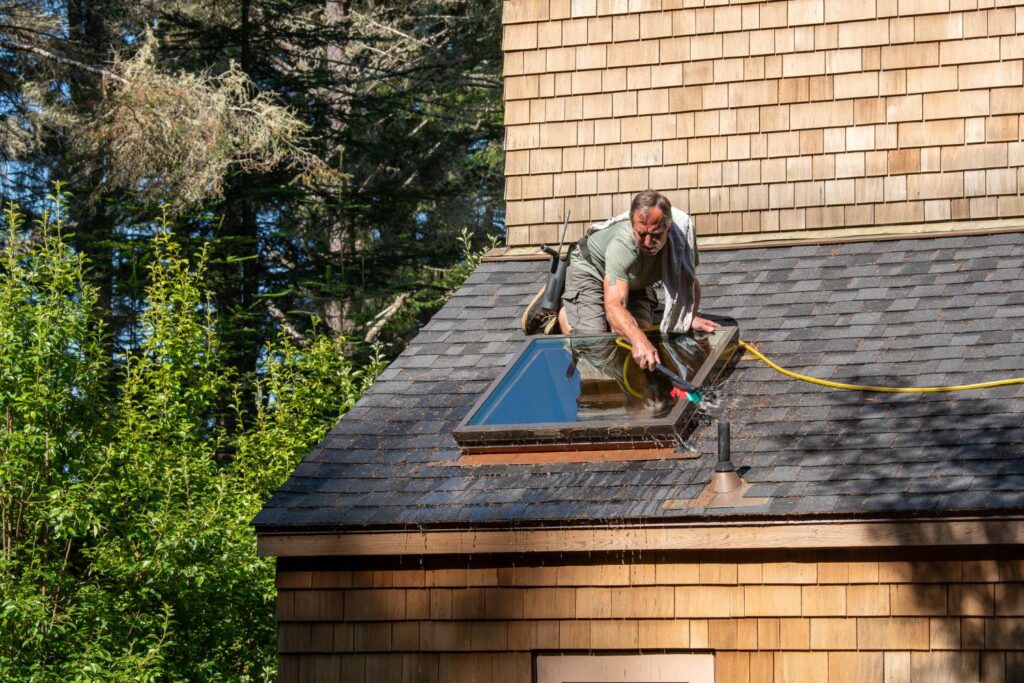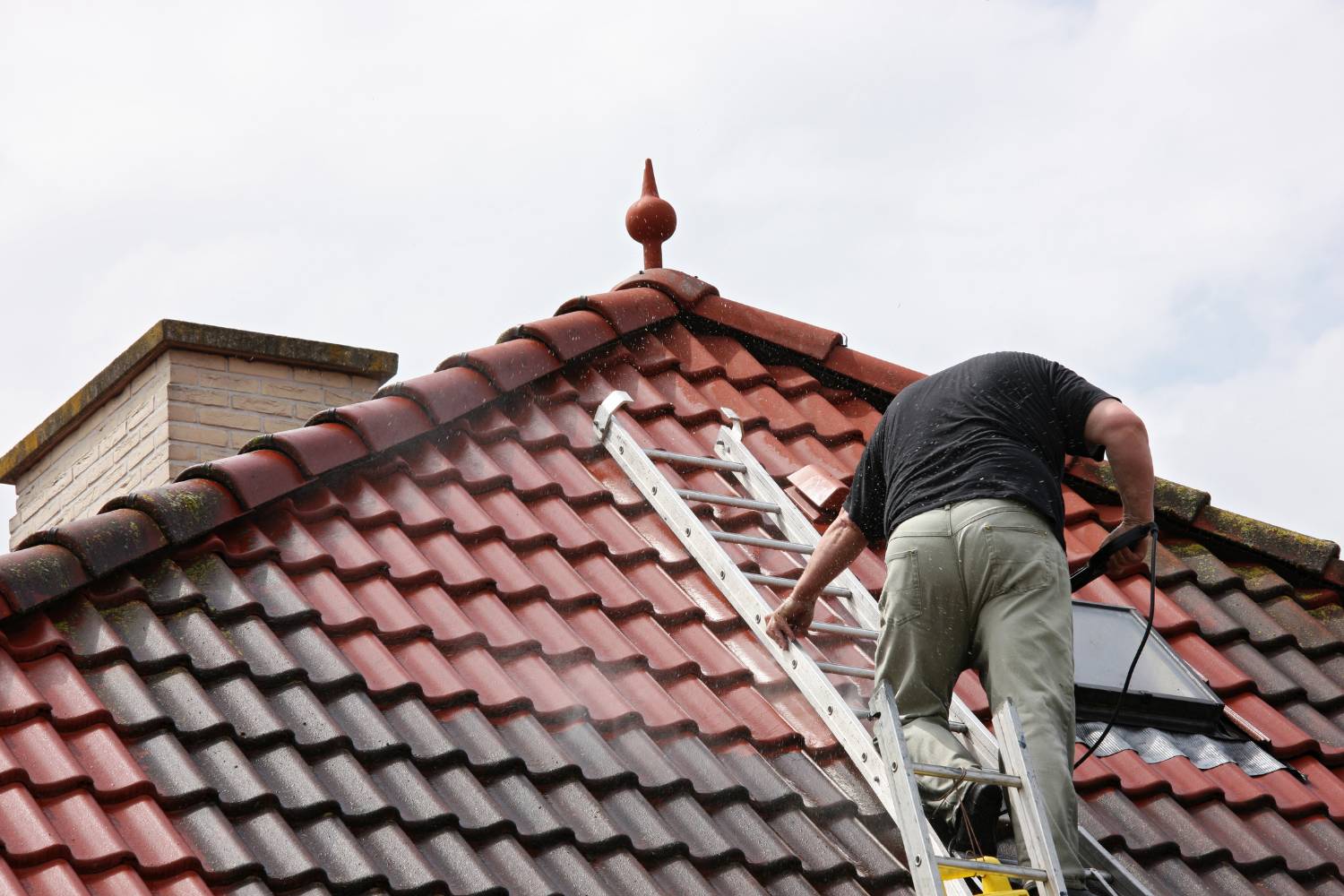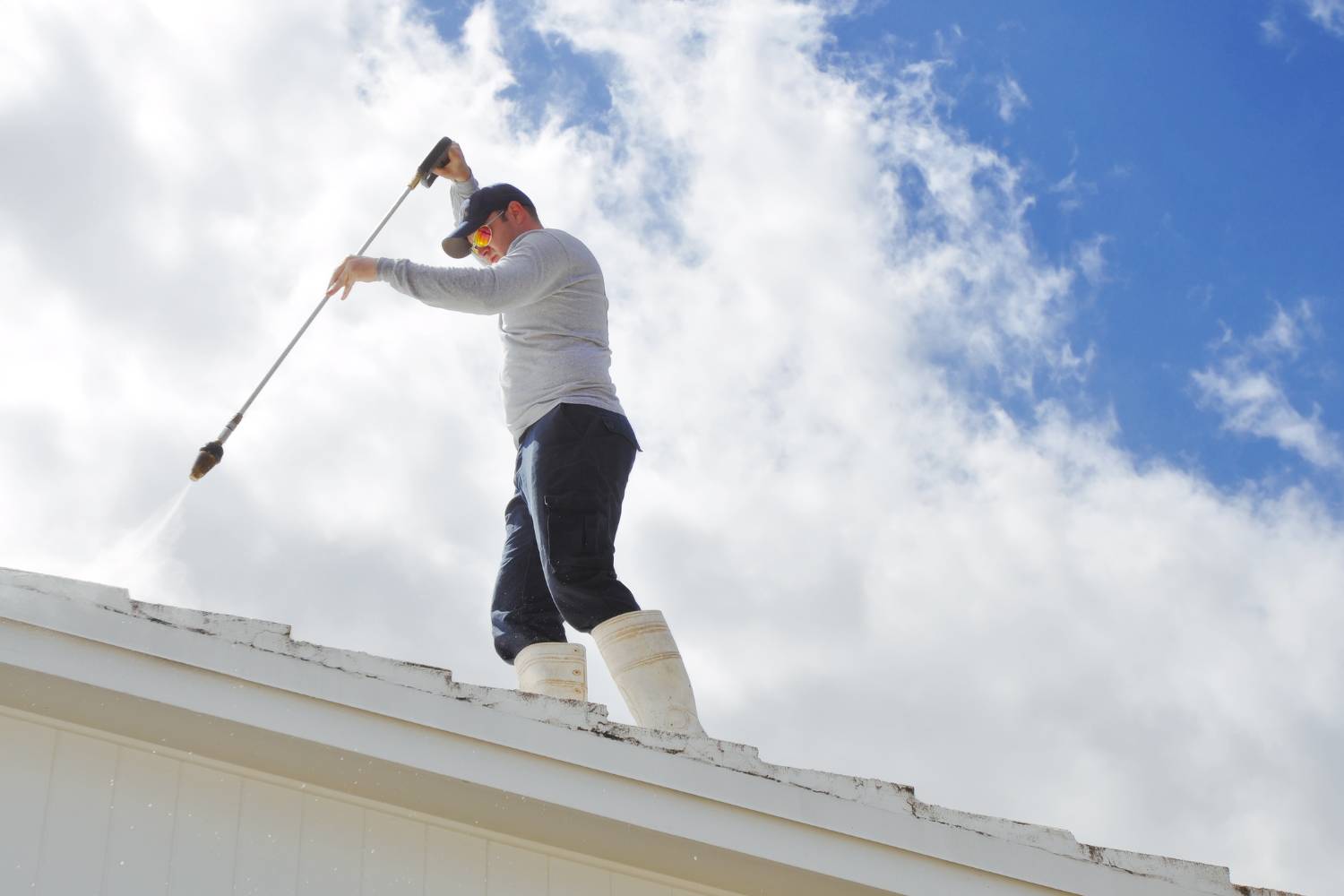Keeping your roof clean might seem like a mundane task, but it holds significant importance in maintaining your home's overall health and aesthetic appeal.
In this post, we'll dive into why regular roof cleaning is essential and the numerous benefits it brings. From enhancing your home's appearance and increasing its value to protecting it from the elements and saving on costs, a clean roof is key to a well-maintained property.
We'll also explore the risks of neglecting roof cleaning and offer insights into how often you should clean your roof, highlighting the impact on health, safety, and financial aspects. Whether you're considering DIY or professional cleaning, understanding the importance of this often-overlooked maintenance task can help you preserve your home's integrity for years to come.
The Benefits Of Regular Roof Cleaning
Regular roof cleaning is a crucial aspect of home maintenance that is often overlooked. Proper care and cleaning of your roof not only enhance the appearance of your home but also extend the life of your roofing materials, protect against potential damage, and offer several other significant benefits. Here are the key advantages of maintaining a clean roof:
Enhanced Home Appearance
- Boost Curb Appeal: Regular roof cleaning removes dirt, moss, algae, and other debris, restoring the roof's original colour and beauty. This contributes to an overall well-maintained look for your home.
- Increased Property Value: A clean and well-maintained roof can increase your home's value, making it more attractive to potential buyers. A roof in good condition signals that the entire property is well cared for.
- Positive First Impression: A clean roof makes a positive first impression on visitors and potential buyers, indicating that the homeowner takes pride in their property.
Protection From The Elements
- Water Damage Prevention: Regular cleaning prevents the buildup of moss, algae, and debris that can hold moisture against the roof surface, leading to water damage and leaks.
- Pest Prevention: Moss and debris can attract pests such as insects and rodents. Cleaning your roof reduces the likelihood of infestations that can damage your home.
- Improved Drainage: A clean roof ensures that water flows properly into gutters and away from your home, preventing water damage and roof collapse.
Financial Savings
- Extended Roof Lifespan: Removing harmful elements like moss and algae can prevent premature wear and tear, extending the life of your roof.
- Avoid Costly Repairs: Regular cleaning can prevent minor issues from becoming major problems, saving you money on expensive repairs or roof replacements.
- Lower Insurance Premiums: Maintaining a clean roof can lower your homeowner’s insurance premiums, as insurance companies often offer better rates to homes that are well-maintained.
Improved Energy Efficiency
- Better Insulation: A clean roof helps maintain proper ventilation and insulation, which can reduce energy costs by keeping your home cooler in the summer and warmer in the winter.
- Lower Utility Bills: By improving the efficiency of your heating and cooling systems, a clean roof can help lower your utility bills.
Warranty Compliance
- Maintain Warranty Validity: Many roofing material warranties require regular maintenance, including cleaning. Keeping your roof clean ensures that you remain in compliance with warranty terms, protecting you from potential costs associated with premature roof failure.
Professional Vs. DIY Cleaning
- Safety and Effectiveness: While DIY cleaning can be cost-effective, it can also be dangerous and may not be as thorough as professional cleaning. Hiring professionals ensures that your roof is cleaned safely and effectively, using the right techniques and products.
What Are The Risks Of Neglecting Roof Cleaning?
Neglecting roof cleaning can lead to various severe consequences for homeowners, ranging from structural damage to health hazards. Here are the key points gathered from the provided resources:
Structural Damage
Moisture retention is one of the primary issues when it comes to neglecting roof cleaning. Moss, algae, and other organic growths have a tendency to retain moisture, which seeps into roofing materials over time. This moisture causes deterioration, leading to rot, decay, and compromised structural integrity of the roof.
Additionally, the accumulation of debris can obstruct proper drainage, causing water to pool on the roof surface. This pooling can result in leaks and significant water damage to the interior of the home. Moreover, leaves, twigs, and other debris can clog gutters, leading to water overflow. This overflow can damage both the roof and the gutters, exacerbating the structural issues.
Aesthetic And Property Value Concerns
The aesthetic appeal of a home can significantly decline due to a dirty, moss-covered roof. Such a roof creates a negative first impression, diminishing the overall curb appeal and resale value of the property. Potential buyers may be deterred by the unsightly appearance, leading to decreased marketability and resale value. Therefore, maintaining a clean roof is crucial for preserving the home's aesthetic appeal and ensuring it remains attractive to potential buyers.
Health Hazards
Health hazards are another major concern associated with neglecting roof cleaning. Moss and debris accumulation on the roof can lead to the growth of mould and mildew. These growths pose health risks, including allergies and respiratory issues, for the household.
Mould spores, once they find their way into the home, can severely impact indoor air quality, further exacerbating health problems. Ensuring the roof is clean can help maintain better indoor air quality and prevent health issues related to mould and mildew.
Pest Infestations
Neglecting roof cleaning can also lead to pest infestations. Moss and debris on the roof provide a habitat for pests such as insects, rodents, birds, and other wildlife. These pests seek shelter, food, and nesting sites in the moist, shaded environment created by moss.
The presence of these pests can cause further structural damage and health hazards. Additionally, dealing with pest infestations often requires costly extermination or remediation efforts. Maintaining a clean roof helps prevent such infestations and the associated problems.
Safety Hazards
Safety hazards are a significant risk when a roof is not regularly cleaned. Moss-covered roofs become slippery when wet, posing a safety hazard for anyone attempting to access or work on the roof. This increases the risk of falls, which can result in serious injuries or fatalities. Regular maintenance is crucial to prevent accidents and ensure the safety of anyone working on the roof.
Financial Implications
The financial implications of neglecting roof cleaning are substantial. Failure to maintain the roof can lead to premature repairs or early roof replacement, both of which can be costly. Additionally, a dirty roof hampers the roof's ability to reflect sunlight, resulting in increased heat absorption and higher cooling costs. Regular cleaning helps maintain the roof's energy efficiency, potentially lowering energy bills.
How Often Should You Clean Your Roof?
Maintaining a clean roof is essential for preserving the longevity and integrity of your home. However, determining the right frequency for roof cleaning can be challenging, as it depends on various factors such as the type of roof, the local climate, and the surrounding environment. Here is a comprehensive guide on how often you should clean your roof based on expert advice and practical considerations.
Factors Influencing Roof Cleaning Frequency
The type of roofing material plays a significant role in determining how often it should be cleaned. Asphalt shingle roofs, for example, typically need cleaning every 1 to 5 years because they are prone to algae and moss buildup, which can shorten their lifespan.
Metal roofs, on the other hand, require less frequent cleaning, about every 1 to 10 years, as they are less susceptible to mould and mildew. Tile roofs should be cleaned every 6 months to 5 years, depending on the accumulation of dirt and organic matter.
Weather conditions also affect how often a roof needs cleaning. In regions with heavy rainfall, roofs may require more frequent cleaning to prevent mould and mildew growth. In areas with significant snowfall, it is essential to clear snow from roofs to avoid damage from heavy buildup.
The surrounding environment is another crucial factor. Homes surrounded by trees need more frequent cleaning to remove leaves, branches, and other debris. Urban areas with high levels of pollution may also necessitate more regular roof cleaning to remove dirt and pollutants.
The age of the roof is an important consideration as well. Older roofs are more susceptible to damage and may require more frequent inspections and cleanings to maintain their integrity. Additionally, the design of the roof can influence the frequency of cleaning. Complex roof designs with flat areas and multiple valleys can trap water and debris, requiring more frequent cleaning.
Recommended Cleaning Frequency
For asphalt shingle roofs, the recommended cleaning frequency is every 1 to 5 years. Metal roofs generally need cleaning every 1 to 10 years, while tile roofs should be cleaned every 6 months to 5 years. However, the specific cleaning frequency also depends on local factors such as the type and amount of nearby vegetation, climate conditions, and the presence of pollutants.
Signs That Your Roof Needs Cleaning
There are several signs that indicate your roof needs cleaning. One clear sign is the accumulation of debris, such as leaves, branches, and other materials on the roof or in the gutters. Another indicator is the growth of moss and algae, which can be identified by visible green or black streaks. Significant buildup of dirt or bird droppings is also a sign that cleaning is necessary, as these can be acidic and damaging.
How Can Regular Roof Cleaning Prevent Health Issues?
Regular roof cleaning is an essential aspect of property maintenance that is often overlooked. Maintaining a clean roof not only preserves the longevity and value of your home but also plays a critical role in preventing health issues. Here’s how regular roof cleaning can help safeguard your health and well-being:
Prevention Of Mould And Mildew Growth
One of the primary benefits of regular roof cleaning is the prevention of mould and mildew growth. Moss, algae, and lichen thrive in damp, shaded environments, commonly found on neglected roofs. These organisms retain moisture, which can lead to the deterioration of roofing materials and create an ideal environment for mould and mildew to grow.
Mould spores can easily enter your home, negatively impacting indoor air quality and potentially causing respiratory problems, allergies, and other health issues. By regularly cleaning your roof, you remove these harmful organisms, thus preventing the growth of mould and mildew and maintaining a healthier living environment.
Reduction Of Allergens
A dirty roof can harbour a variety of allergens, such as pollen, dust, and organic debris. These allergens can be dislodged and enter your home's ventilation system, exacerbating allergies and respiratory conditions for the occupants. Regular roof cleaning helps to eliminate these potential allergens from your roof, reducing the risk of allergic reactions and ensuring cleaner air within your home.
Prevention Of Pest Infestations
Neglecting roof cleaning can lead to pest infestations. Accumulated debris, moss, and organic matter on your roof provide an attractive habitat for pests like insects, rodents, birds, and other wildlife. These pests can cause significant damage to your property and pose health risks.
For instance, rodents and birds can carry diseases and their droppings can contaminate the air. Regular roof cleaning removes the debris and organic matter that attract these pests, helping to keep your home pest-free and safeguarding your health.
Improved Indoor Air Quality
Regular roof cleaning helps improve indoor air quality by preventing the growth of mould, mildew, and algae. When these organisms grow on your roof, they can release spores and particles that enter your home and degrade air quality. This can lead to respiratory issues, especially for those with preexisting conditions such as asthma. By keeping your roof clean, you ensure that the air inside your home remains fresh and healthy.
Early Detection Of Roof Damage
Regular roof cleaning provides an opportunity for early detection of potential roofing issues. During the cleaning process, any signs of damage, such as cracked, broken, or missing tiles, can be identified and addressed promptly.
Early intervention can prevent minor issues from developing into significant problems that could affect your home's structural integrity and health safety. This proactive approach not only extends the lifespan of your roof but also ensures a safe and healthy living environment.
Conclusion
Regular roof cleaning is an essential task that offers numerous benefits, from enhancing your home's appearance and value to protecting it from structural damage and health hazards. By maintaining a clean roof, you can prevent costly repairs, improve energy efficiency, and ensure compliance with warranty requirements.
Whether you choose to clean your roof yourself or hire professionals, the key is to establish a routine that suits your home's specific needs and environment. By doing so, you will not only preserve the integrity and longevity of your roof but also contribute to a safer and healthier living environment for you and your family.
Frequently Asked Questions
The frequency of roof cleaning depends on several factors, including the type of roofing material, the local climate, and the surrounding environment. Generally, asphalt shingle roofs should be cleaned every 1 to 5 years, metal roofs every 1 to 10 years, and tile roofs every 6 months to 5 years. Homes in areas with heavy rainfall, significant snowfall, or lots of surrounding vegetation may require more frequent cleanings.
Neglecting regular roof cleaning can lead to several issues, including structural damage, decreased property value, health hazards, pest infestations, and safety risks. Moss, algae, and debris can retain moisture, causing rot and leaks, while clogged gutters can lead to water overflow and damage. Additionally, a dirty roof can harbour mould and mildew, posing health risks, and attract pests that can damage your home.
While DIY roof cleaning can be cost-effective, it can also be dangerous and may not be as thorough as professional cleaning. Hiring professionals ensures that your roof is cleaned safely and effectively, using the right techniques and products. Professionals can also inspect your roof for any signs of damage and address minor issues before they become major problems.
Regular roof cleaning can significantly extend the lifespan of your roof by preventing the buildup of moss, algae, and debris that can cause premature wear and tear. By removing these harmful elements, you can prevent water damage, rot, and other issues that compromise the structural integrity of your roof. This proactive maintenance helps your roof last longer and perform better.
Regular roof cleaning can save you money in several ways. By preventing minor issues from becoming major problems, you can avoid costly repairs or roof replacements. A clean roof can also improve your home's energy efficiency, reducing heating and cooling costs. Additionally, maintaining a clean roof can lower your homeowner's insurance premiums, as insurance companies often offer better rates to homes that are well-maintained.


